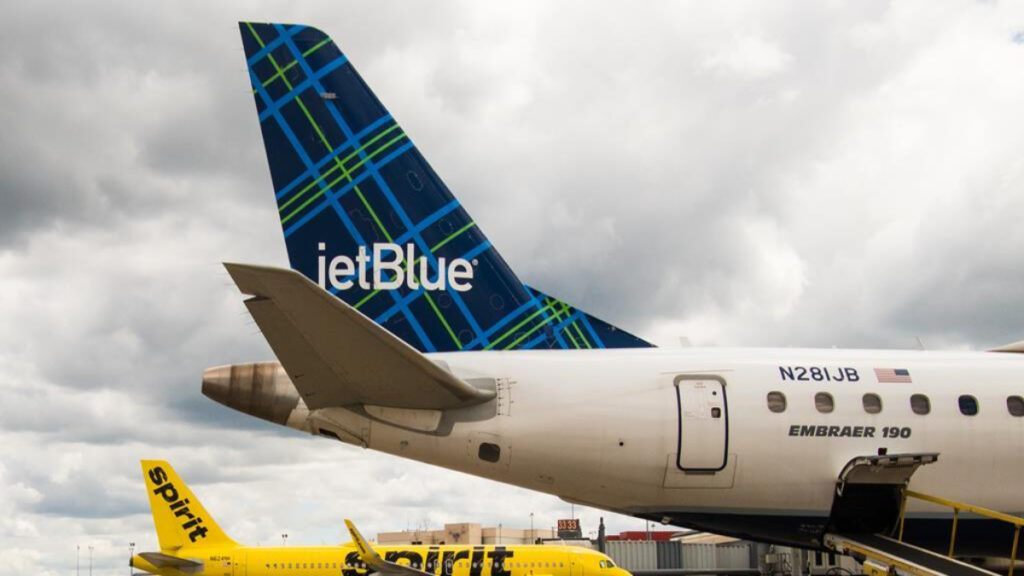
A Federal judge blocked JetBlue Airways’ purchase of budget rival Spirit Airlines, a significant win for Biden’s Justice Department, which sued to stop the merger, alleging it would drive up fares for some of the most price-sensitive consumers.
JetBlue’s intended $3.8 billion acquisition of the discount carrier Spirit aimed to create the nation’s fifth-largest airline. Both carriers argued that the deal would enhance their ability to expand and compete more effectively against larger rivals such as Delta and United.
The ruling, issued by a federal judge in Boston, is a success for the Justice Department, which has actively pursued blocking deals it deems anti-competitive. The department claimed in its lawsuit filed in March that JetBlue’s plan to acquire Spirit would eliminate unique competition provided by Spirit, representing about half of all ultra-low-cost airline seats in the industry.
The Justice Department argued that such a merger would result in higher fares and fewer options for tens of millions of travelers. Following the announcement of the decision, Spirit shares experienced a significant drop, declining by 60%.
ALSO READ: Real Reasons Why Airplanes Dim Cabin Lights During Takeoff and Landing
JetBlue shares also decreased about 5%, following a brief spike. Currently, neither airline has provided immediate comments on the court’s decision. JetBlue has contended that access to Spirit’s comparable fleet of Airbus planes would enable it to expand rapidly during limited aircraft and pilot availability periods.
The airline asserts that such growth is necessary to compete effectively against larger carriers. Previous years of consolidation have resulted in United, Delta, American, and Southwest controlling about three-quarters of the domestic market.
POLL — Should the Government Increase Taxes on the Wealthy To Reduce Economic Inequality?
With the court’s decision, JetBlue, based in New York, now faces the challenge of determining its next steps. Incoming CEO Joanna Geraghty will be tasked with navigating the airline on a new course. Geraghty was announced as the successor to CEO Robin Hayes after he announced his retirement earlier this month.
Operating in highly congested airspace in New York and other cities, JetBlue intended to utilize Spirit to access additional routes and attract more travelers. The airline had plans to revamp Spirit’s distinctive yellow planes by rebranding them and rearranging the tightly packed seating, aiming to offer a more comprehensive full-service model.
Spirit has experienced rapid growth in recent years by adopting a business model offering inexpensive fares and charging fees for various services, including seat assignments and carry-on luggage.
ALSO READ: Airline Fires Gate Agent for Putting Unaccompanied 6-Year-Old on a Wrong Flight
One customer shared, “I fly on JetBlue for its inclusive policy of disabled passengers, which is a must for me. Stopping the merger will keep the cost down and quality up.”
Another commenter expressed a different perspective: “In truth, United, Delta, American, and Southwest lobbied (AKA: Paid) the government to block this merger to prevent any increased competition in the market.
The reasoning behind the block is total BS and makes no sense. Only these four companies are allowed access to the majority of travelers. If you add JetBlue and Spirit travelers, it’s still less than half the average travelers as these 4 companies.”
You Might Also Like:
Actress Saoirse Ronan Reveals Greta Gerwig Approached Her to Play” Weir” Barbie
Atlanta Hospital Employee Fired for Refusing Flu Vaccine Wins Wrongful Termination Lawsuit
Massachusetts Governor Hails Navy SEAL Who Died While Saving Fellow SEAL During Mission
22-Year-Old Man Who Vaped Heavily Gets Double Lung Transplant
Multiple Transgender Deaths Spark Outrage Among LGBTQ Community in Mexico
